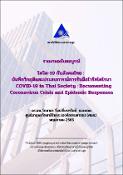บทคัดย่อ
โครงการวิจัยโควิด-19 กับสังคมไทย : บันทึกวิกฤติและประสบการณ์การรับมือไวรัสโคโรนา (COVID-19 in Thai Society: Documenting Coronavirus Crisis and Epidemic Responses) มีวัตถุประสงค์เพื่อบันทึกประสบการณ์ ทำความเข้าใจวิธีคิดและวิธีปฏิบัติในการรับมือกับโควิด-19 ของกลุ่มเป้าหมาย 5 กลุ่ม ได้แก่ (1) กลุ่มผู้บริหารและมีส่วนกำหนดนโยบาย (2) กลุ่มบุคลากรทางการแพทย์ (3) กลุ่มผู้ปฏิบัติงานควบคุมโรคและงานเชิงรุก (4) กลุ่มผู้มีความเปราะบางและด้อยโอกาส และ (5) กลุ่มประชาชนทั่วไปและสื่อมวลชน โดยใช้ระเบียบวิธีวิจัยเชิงคุณภาพผสมกับการวิจัยเชิงปริมาณ โดยการสัมภาษณ์กลุ่มเป้าหมายแบบเจาะลึก จำนวน 148 คน สำรวจเก็บข้อมูลโดยแบบสอบถามจากกลุ่มประชาชน จำนวน 555 คน รวมทั้งเก็บข้อมูลจากเอกสารที่เผยแพร่ทางสื่อออนไลน์ ระยะเวลาในการเก็บข้อมูลตั้งแต่เดือนมีนาคมถึงเดือนพฤศจิกายน 2564 ข้อมูลทั้งหมดได้นำมาวิเคราะห์ด้วยวิธีการศึกษาทางมานุษยวิทยา เพื่อชี้ให้เห็นว่าการระบาดของโควิด-19 คือ โรคระบาดทางสังคม (syndemics) ที่สะท้อนความไม่เท่าเทียมทางสังคม เศรษฐกิจการเมืองและวิถีชีวิตของมนุษย์ ผลการศึกษาประกอบด้วย 5 ส่วน คือ (1) การบันทึกเหตุการณ์สำคัญของการระบาดของโควิด-19 ในประเทศไทยซึ่งแบ่งเป็น 5 ช่วง (2) การศึกษาประสบการณ์ท่ามกลางวิกฤติโควิด-19 ของกลุ่มเป้าหมาย 5 กลุ่ม (3) บทเรียนการทำงานขององค์กรต่างๆ ในวิกฤติโควิด-19 (4) บทวิเคราะห์องค์ความรู้สังคมศาสตร์ในสถานการณ์โรคระบาด (5) บทสรุปและข้อเสนอแนะเชิงนโยบาย ข้อค้นพบสำคัญ 4 ประเด็นคือ (1) รัฐไทยใช้ความรู้ทางการแพทย์ เศรษฐกิจและการปกครองที่นำไปสู่ระบอบอำนาจสั่งการแบบรวมศูนย์ที่เน้นการควบคุมประชาชนให้อยู่ในกฎระเบียบแบบเดียวกันโดยมองข้ามเงื่อนไขที่แตกต่างกันของพื้นที่และบริบทของชุมชน ทำให้การแก้ปัญหาต่างๆ ไม่ตอบสนองความต้องการของประชาชน ประกอบกับการละเลยความรู้ทางสังคม ส่งผลให้การดำเนินงานของรัฐผลิตซ้ำความรุนแรงเชิงโครงสร้างที่ทำให้ผู้ด้อยโอกาสเสียประโยชน์จากมาตรการต่างๆ (2) การประสานความร่วมมือของหน่วยงานรัฐและเอกชนที่เกิดขึ้นในแต่ละท้องถิ่นดำเนินไปอย่างลุ่มๆ ดอนๆ ขาดการวางแผนล่วงหน้าและมีการเปลี่ยนแปลงวิธีปฏิบัติตลอดเวลา ทำให้เกิดความขัดแย้งในการทำงาน รวมทั้งไม่มีการคุ้มครองสวัสดิภาพของเจ้าหน้าที่ที่ปฏิบัติงานอย่างดีพอ (3) ประชาชนขาดความเชื่อมั่นต่อรัฐบาลเนื่องจากรัฐทำงานล่าช้า ไม่โปร่งใส ปกปิดข้อมูล เกิดความคลุมเครือและความไม่ชัดเจนในการสื่อสารกับสาธารณะ ให้อภิสิทธิ์กับคนบางกลุ่ม ส่งผลให้ประชาชนออกมาประท้วงและเรียกร้องให้รัฐบาลลาออก (4) เกิดผลที่ไม่คาดคิดในมาตรการของรัฐตามมาหลายประการ โดยเฉพาะการประกาศล็อกดาวน์และสั่งปิดกิจการต่างๆ ทำให้ประชาชนที่เป็นแรงงานรับจ้างนอกระบบจำนวนมากได้รับผลกระทบและในส่วนท้ายของงานวิจัยจะเป็นการให้ข้อเสนอแนะเชิงนโยบายเพื่อให้หน่วยงานของรัฐนำไปพิจารณาสำหรับการใช้แก้ไขปัญหาโรคระบาดในอนาคต
บทคัดย่อ
This research aims to understand and uncover experiences, thoughts and practices of the 5 groups of people in dealing with COVID-19 includes (1) executives and policy makers (2) medical and public health officers (3) disease control workers (4) poor and disadvantaged people and (5) civil people and journalists. This study used both qualitative and quantitative research methodology. Conducting in-depth interviews with 148 people and use an online questionnaire to get the data from 555 samples. Information from social media and online documents are also collected. From March to November 2021 is the period of data collecting. This study uses anthropological perspectives to suggest that the COVID-1 9 crisis is syndemics that inseparably related to unequal society, economy, politics and human life. The 5 chapters of this research are: (1) recording important events of the COVID-1 9 outbreak in Thailand, which is divided into 5 periods. (2) a study of the experiences of 5 target groups. (3) lessons in the work of various organizations in the COVID-19 crisis. (4) an analysis of social science knowledge in an pandemic situation. (5) conclusions and policy recommendations. The four key findings are: (1) the Thai state uses medical, economic and governance knowledge that leads to a centralized command system and controls people in the same inflexible regulation. The Thai state does not understand the different changing socio-cultural contexts found in local areas and communities. Government solutions do not meet the needs of the people. Social science knowledge disappears from the Thai state policy-making that reproduces and expands structural violence in which the disadvantaged people are damaged. (2) failed coordination between government agencies, civil organizations and the private sectors can be found in every local communities. Government officials do not plan for effective work and change practices over time. This problem is the source of conflicts. Another important problem is that there are a poor welfare and caring for medical and public health workers. (3) people distrust in the government because of their inefficient work and error decision making. The Thai government fail to give public enough and clear information but give privileges to some people. This problem leads to the people protests and calling for the government resign. (4) there have been several unexpected consequences in government policy. Particularly, the lockdown and the close of various businesses that affects many people who work in the informal sector. Policy recommendations are outlined in the final chapter for government agencies to take account in solving the pandemic in the future.


